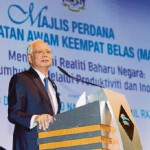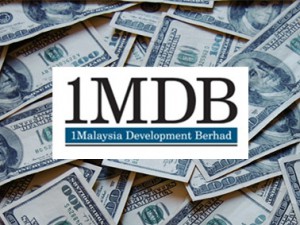Facebook changes name to Meta as it refocuses on virtual reality
Facebook Inc is now called Meta, in a rebrand that focuses on building the “metaverse,” a shared virtual environment that it bets will be the successor to the mobile internet. The name change comes as the world’s largest social media company battles criticisms from lawmakers and regulators over its market power, algorithmic decisions and the policing of abuses on its services. CEO Mark Zuckerberg, speaking at the company’s live-streamed virtual and augmented reality conference, said the new name reflected its work investing in the metaverse, rather than its namesake social media service, which will continue to be called Facebook. The company, which has invested heavily in augmented and virtual reality, said the change would bring together its different apps and technologies under one new brand. It said it would not change its corporate structure. (The Star)
78 abandoned housing projects involving over 17,000 units in peninsular Malaysia
A total of 78 private sector projects involving 17,605 housing units with 11,735 buyers involved has been classified as ‘abandoned’ in peninsular Malaysia, said Minister of Housing and Local Government (KPKT) Datuk Seri Reezal Merican Naina Merican. He said this year his ministry had rescued seven abandoned housing projects through an intervention of negotiations, facilitation and enforcement. “So far, four projects (a total of 82) have been successfully restored and three more projects are expected to be completed by end of 2021,” he said. Reezal Merican said in Selangor alone, there were 32 abandoned projects comprising 10,855 residential units. He added that KPKT is examining all housing projects that are ‘sick’, delayed and abandoned through the establishment of a ‘War Room’ for government intervention, which he is personally chairing. (Malay Mail)
Long-term visit pass holders do not need clearance to enter Malaysia from Nov 1
From Nov 1, foreigners holding Malaysian long-term visit passes will be permitted to enter the country without going through immigration clearance via MyTravelPass/MyEntry as long as the pass is valid. Immigration Department director-general Datuk Khairul Dzaimee Daud said the matter was decided at the Special Committee on Pandemic Management Meeting. “Foreigners who are not under the mentioned categories are still required to apply via the MTP/MYEntry for clearance to enter Malaysia. These include those on social visits and long-term visit pass holders with expired passes,” he said. Khairul Dzaimee said the entry procedure upon arrival in Malaysia is still subject to the existing immigration rules which are still in force as well as Health Ministry’s health screening and quarantine procedures. (NST Online)
Glomac: Prospects intact, RM8bil GDV within Klang Valley
Glomac Bhd remains cautious of the lingering impact of COVID-19 on the property market, however, the company’s longer-term prospects remain intact. Group managing director and CEO Datuk Seri Fateh Iskandar Mohamed Mansor said given the group’s healthy balance sheet, Glomac is well placed to accelerate development activities by tapping into its strong development pipeline that has a potential estimated GDV of RM8 billion, largely within the Klang Valley. On the near-term performance, Fateh Iskandar said with the easing of economic restrictions, there would be an improvement especially for construction activities to commence and for the group’s sales gallery to reopen. “The new launches comprise mainly of landed residential phases within the midmarket and affordable segments that have continued to garner a solid response,” he said. (The Star)
Quarantine requirements discourage Malaysian and global tourists from travelling
Air travellers are increasingly frustrated with Covid-19 travel restrictions even as travel slowly resumes globally, says the International Air Transport Association (IATA). “People are increasingly frustrated with the Covid-19 travel restrictions and even more have seen their quality of life suffer as a result. They don’t see the necessity of travel restrictions to control the virus,” said IATA director-general Willie Walsh. The survey by IATA polled 4,700 people in 11 markets in September. For many of the respondents (73%), Covid-19 travel restrictions have negatively affected their quality of life. Walsh said that the inability to travel had caused many people to miss family moments, personal development opportunities and business priorities. According to IATA, the biggest deterrent to air travel continues to be quarantine measures. In fact, the majority of those surveyed (84%) indicated that they will not travel if there is a chance of quarantine at their destination. (The Star)
China cracks down on vanity-project super skyscrapers
China has restricted the construction of extremely tall skyscrapers in smaller cities as part of a crackdown on wasteful vanity projects by local governments. Without special approval, cities with populations of less than 3 million must not build skyscrapers taller than 150m (492.13ft), and cities with larger populations must not construct buildings higher than 250m, the Ministry of Housing and Urban-Rural Development said. The measures go further than an existing ban on buildings of more than 500m. China has some of the tallest buildings in the world, including the 632m Shanghai Tower and the 599.1m Ping An Finance Centre in Shenzhen. While China acknowledges that high-rise buildings promote more intensive use of land resources, it is increasingly concerned that local officials are blindly pursuing construction with little attention to practicality and safety. (FMT)
Malaysia ranks among popular spots for bitcoin mining
Malaysia ranks among popular spots for bitcoin mining alongside Kazakhstan, Iran and Russia, behind the US and China. The Wall Street Journal (WSJ) said the US is fast becoming the new global hub for bitcoin mining. It said that after a government crackdown in China, many miners are betting on reliable access to energy and a more predictable regulatory environment in the US. China had previously been the dominant country for companies to place computers working to unlock new bitcoin, but authorities started a crackdown in May against bitcoin mining and trading that is aimed at ensuring government control of its economy. Bitcoin mining has become a lucrative endeavour with the price of one bitcoin currently worth about US$60,000. Before its near-total ban, the country accounted for almost half of the global computing power dedicated to bitcoin mining. (The Edge)





